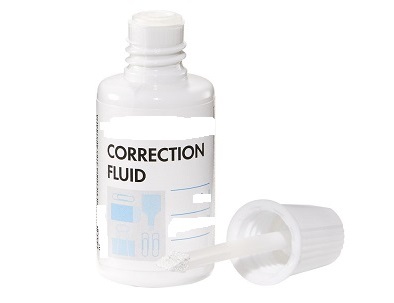By Donald Unger
4 November 2016
WASHINGTON – The federal Office of Diversion Control (ODC), a unit of the US Department of Justice’s Drug Enforcement Administration today announced a further expansion of items to be placed on Controlled Substance Schedules I & II—the former indicating a total legal ban on production, sale, possession, or use; the latter reserved for substances recognized to have some, strictly limited, legal uses, under stringently enforced guidelines and regulations.
“People who claim that they need Correction Fluid or Magic Markers have already flagged themselves as having a suspicious attachment to outdated, essentially useless, technologies,” said ODC press liaison Mack Bolan, in announcing the new bans. Previous restrictions on these items—the required purchase of a typewriter with every bottle of Liquid Paper and the “one bottle per month” limit, for example—have, according to Bolan, not been sufficient to curb what he referred to as “a dangerous epidemic of office supply sniffing.”
Moving gasoline—“another Huffer’s Delight,” Bolan pointed out—from “prescription only” to Schedule II is expected to cause a somewhat greater backlash. Bolan noted, however, that “driving is a privilege, not a right,” adding, “I will put aside the issue of why someone would choose a hydrocarbon vehicle over a battery-electric vehicle, if they didn’t have bad intentions.”
The new guidelines will not affect the current status of aspirin, acetaminophen, or non-steroidal anti-inflammatory (NSAID) medications, which will remain available under Schedule II restrictions. ODC continues to pursue an outright ban on these substances, however. “People who argue that they simply want to ‘feel better,’” according to Bolan, “are basically making a confession that they want to purchase substances for the sole purpose of changing their physiological or mental states. This should be easily recognized for the fundamentally Un-American position that it is.”
Reince Priebus, a spokesman for CAN-IT, the Caffeine, Alcohol, and Nicotine Industrial Triad, expressed both support and “eternal gratitude” for the ODC’s ongoing efforts to “keep Americans safe from the ravages of addiction.”
ODC will formally release the new guidelines and bans during the broadcast of its weekly Restriction Update conference call, over the Internet, at 9:00 A.M. (EDT) on 4 July at http://www.DEA.gov.
“We felt Independence Day was the perfect time to underscore our commitment to freeing Americans from the bad choices they so stubbornly keep making,” Bolan said.
Headquartered in Springfield, Virginia, the Office of Diversion Control is a unit of the US Justice Department’s Drug Enforcement Administration. Subsequent to taking over the American Medical Association, the American Pharmacists Association, the American Nurses Association, and the 7/11 Corporation—“a triple threat,” Bolan pointed out, “a source for overpriced office supplies and over the counter medication, as well as gasoline”—ODC has now surpassed the armed forces to become the largest unit of the federal government.
Don Unger was born at New York’s Mount Sinai Hospital and has spent more than fifty years now touring medical facilities across Europe and the Americas. He has published about thirty short stories, a handful of poems, hundreds of journalistic pieces, and done a few dozen radio commentaries for local NPR affiliates. He writes the occasional unpublishable novel as well—one of which was his MFA thesis. He was disappointed to discover that his PhD did not earn him a prescription pad. He accepts that writing is clear evidence of mental illness; he also understands that any relief writing provides is symptomatic and temporary. He has had a headache since 1990.






Be First to Comment